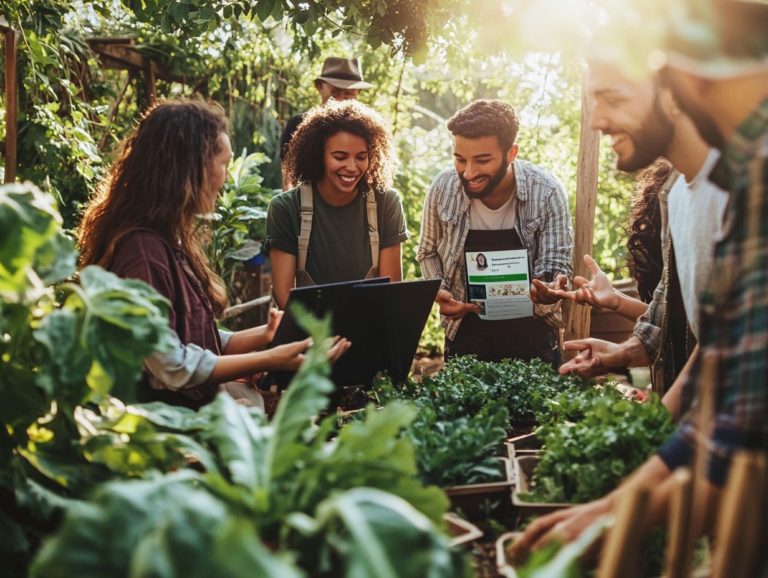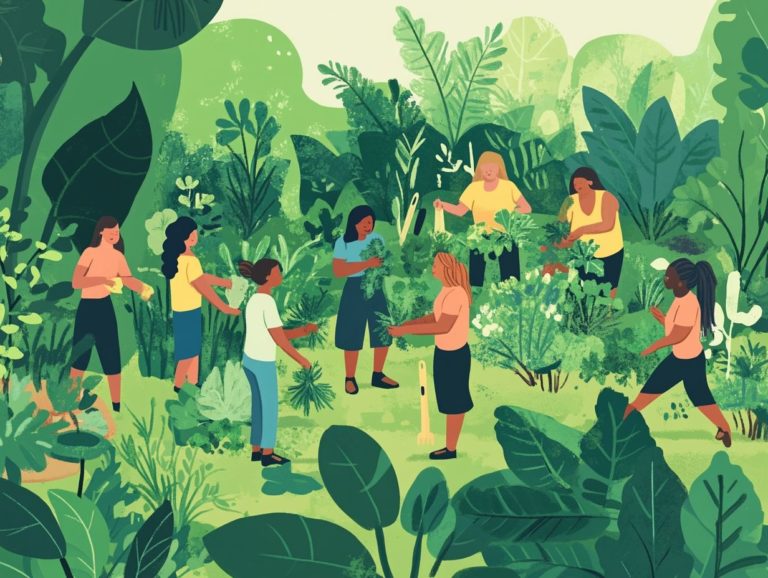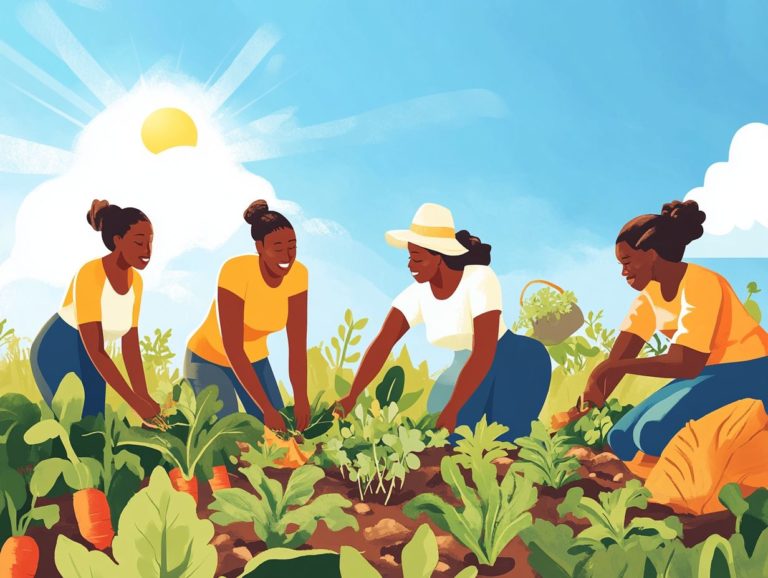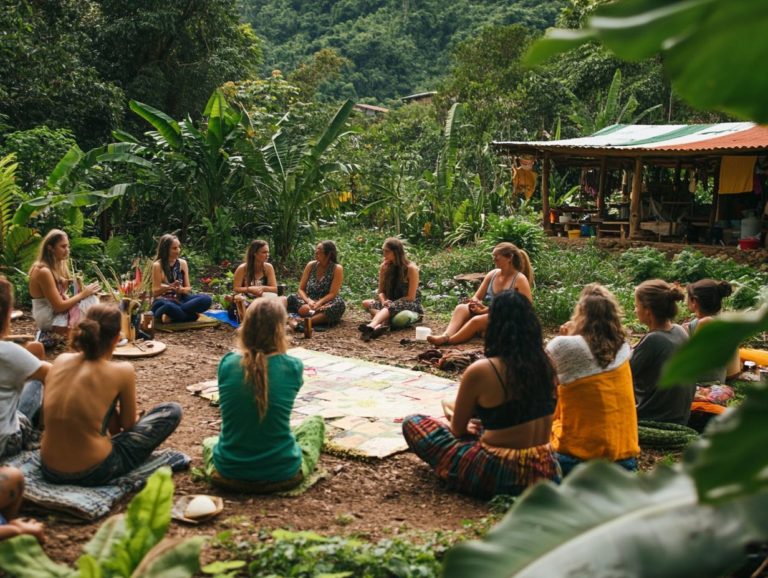8. How to Start a Permaculture Group in Your Area
Permaculture transcends mere gardening; it embodies an overall approach for living sustainably while fostering a harmonious relationship with the environment through a well-designed permaculture garden.
This article delves into the core essentials of permaculture, illuminating its guiding principles and the myriad benefits of establishing a permaculture group. By focusing on sustainable design and community connections, these groups can create a meaningful impact.
Discover how to start your own permaculture group and make a real difference in your community! From engaging prospective members to navigating common challenges, this guide equips you with essential tools for thriving in this enriching endeavor while observing your land and using effective gardening principles.
Contents
- Key Takeaways:
- Understanding Permaculture
- Benefits of Starting a Permaculture Group
- Steps to Starting a Permaculture Group
- Resources for Permaculture Groups
- Overcoming Challenges in Starting a Permaculture Group
- Frequently Asked Questions
- 1. What is a permaculture group?
- 2. Why should I start a permaculture group in my area?
- 3. How do I find others interested in permaculture in my area?
- 4. What activities can a permaculture group do together?
- 5. Do I need to have experience in permaculture to start a group?
- 6. How can I ensure the success and longevity of a permaculture group?
Key Takeaways:
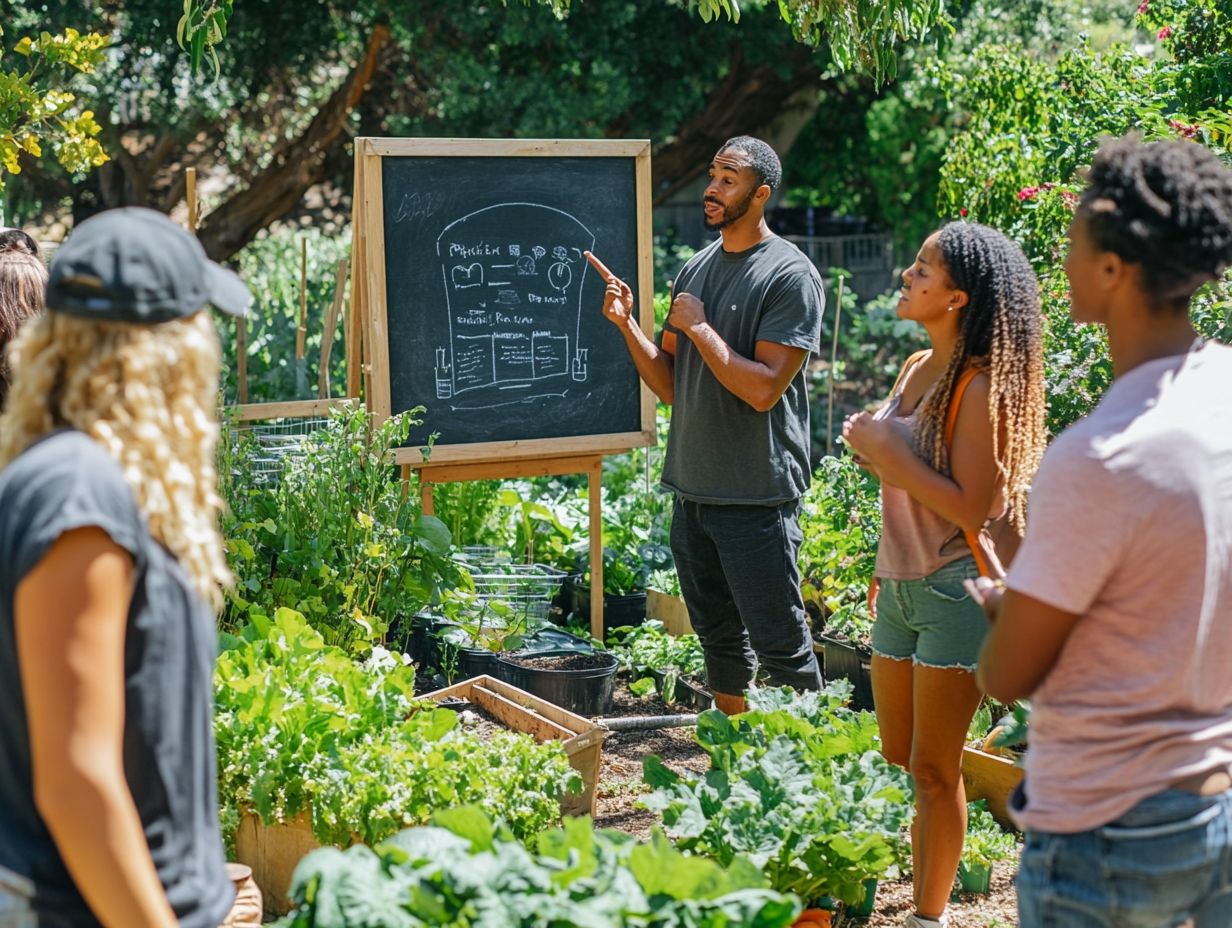
- Permaculture is a sustainable approach to living that focuses on working with nature.
- Join forces in your community to support sustainability through permaculture!
- Engage potential members, organize meetings, and utilize online resources to overcome challenges in starting a permaculture group.
Understanding Permaculture
Understanding permaculture is crucial if you want to grow sustainable gardens that honor nature s ecological balance and foster meaningful community connections through native plants and biodiversity. This overall approach to gardening invites you to observe your land closely, employ sustainable design practices, and integrate elements such as water systems, soil health, and plant diversity.
By studying natural ecosystems and mimicking their patterns, permaculture empowers you to create resilient spaces that yield food through effective planting strategies while nurturing biodiversity and promoting environmental stewardship. Embracing these principles can elevate your backyard gardening projects into thriving community gardens that embody the ethical tenets of sustainability.
What is Permaculture?
Permaculture is a design philosophy that seamlessly weaves ecology and sustainable practices into your gardening and land management efforts. This includes strategies like no-dig gardening (a method that avoids turning the soil) and efficient water systems.
Emerging in the 1970s from the innovative minds of Bill Mollison and David Holmgren, this approach is all about creating sustainable agricultural ecosystems that mirror the intricacies of natural systems. At its core, permaculture champions diversity, enhances ecosystem services, and promotes localized food production, encouraging practices like organic farming.
By embodying these principles, you can cultivate resilient gardens that reflect nature’s patterns, maximizing water efficiency, soil health, and biodiversity. Permaculture principles extend beyond the garden into urban areas and community development, fostering connections that support ecological balance and encourage sustainable living practices.
The Principles of Permaculture
The principles of permaculture empower you to create systems that are sustainable, regenerative, and in perfect harmony with nature. By emphasizing garden observations and interacting with local ecosystems, you cultivate a deeper connection to your environment.
This approach encourages the use of renewable resources, such as rainwater harvesting and composting, ensuring your garden thrives while minimizing waste. Valuing diversity invites a rich tapestry of plants and animals to support one another in a synergistic relationship.
These foundational concepts contribute to a holistic design philosophy that nurtures the land while promoting ecological balance and resilience.
Start your permaculture journey today and transform your gardening experience into a sustainable practice that benefits your community!
Benefits of Starting a Permaculture Group
Starting a permaculture group can elevate community ties and foster environmental responsibility. By creating a space for knowledge exchange, you promote resource sharing and gardening practices that benefit individuals and the community, and you can learn how to engage with local permaculture initiatives for even greater impact.
Within this group, you ll explore sustainable gardening techniques. Discover innovative composting, like worm composting, and efficient water systems to enhance your gardening journey.
These groups also powerfully encourage community engagement. Connect with your land and promote ecological balance in your neighborhoods through collaborative gardening.
Community Building and Sustainability
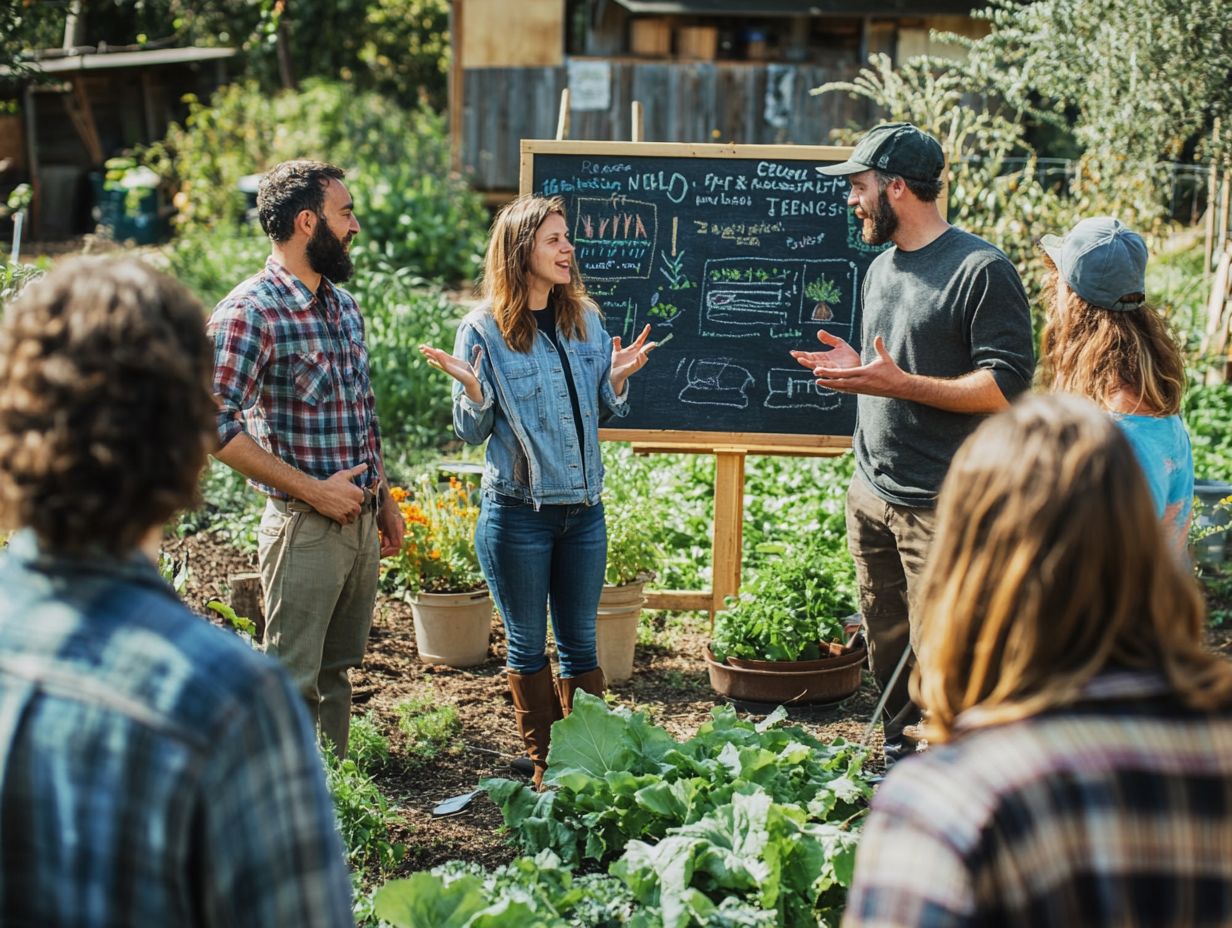
Engaging in local gardening initiatives prioritizes environmental sustainability. These efforts not only provide fresh produce but also strengthen connections among neighbors.
As you collaborate with fellow gardeners, you ll learn from each other. This mutual support is essential for any sustainable effort.
Steps to Starting a Permaculture Group
Starting a permaculture group involves several thoughtful steps that create community bonds. Begin by identifying potential members who share your vision and organizing engaging activities. For those looking to expand their reach, consider checking out how to get involved in local permaculture groups.
By focusing on community involvement and diverse gardening principles, you can launch sustainable garden projects. This collaborative approach leads to a vibrant permaculture community.
Identifying and Engaging Potential Members
Engaging potential members is vital for the success of your permaculture group. Ensure diverse participation in local gardening initiatives.
Create strategies that attract a variety of individuals. Host workshops and events to showcase gardening techniques and spark curiosity.
Explore cultural gardening traditions or collaborate with local artisans. These efforts will transform community gardening into a hub for creativity and collaboration.
Organizing Meetings and Activities
Organizing meetings boosts community support and strengthens bonds through cooperative gardening and resource sharing.
These gatherings can take many forms, like workshops that dive deep into sustainable practices. They provide you with valuable insights into eco-friendly techniques, including water systems and composting that you can easily implement in your own garden. Hosting tool and seed swaps allows you to exchange gardening tools, seeds, and knowledge, fostering a spirit of collaboration and mutual growth.
Join hands with fellow gardeners! Collaborative garden projects not only offer hands-on experience but also ignite creativity and teamwork, making the entire experience more enriching. Such activities elevate individual skills while weaving a tighter community fabric, promoting a shared commitment to sustainable living.
Resources for Permaculture Groups
Accessing a diverse array of resources is vital for the success of permaculture groups. It provides essential support for sustainable gardening endeavors, including the latest gardening techniques. Both online platforms and local resources enrich the knowledge base of group members, offering valuable insights into gardening principles, permaculture techniques, and ecological balance.
From instructional videos to community workshops, these resources create an environment for continuous learning and skill development. They empower you to implement effective practices in your gardening projects, including designing your garden initiatives. Sharing resources cultivates a sense of community support, allowing you and your fellow members to collaborate and engage more meaningfully in local gardening initiatives.
Online and Local Resources
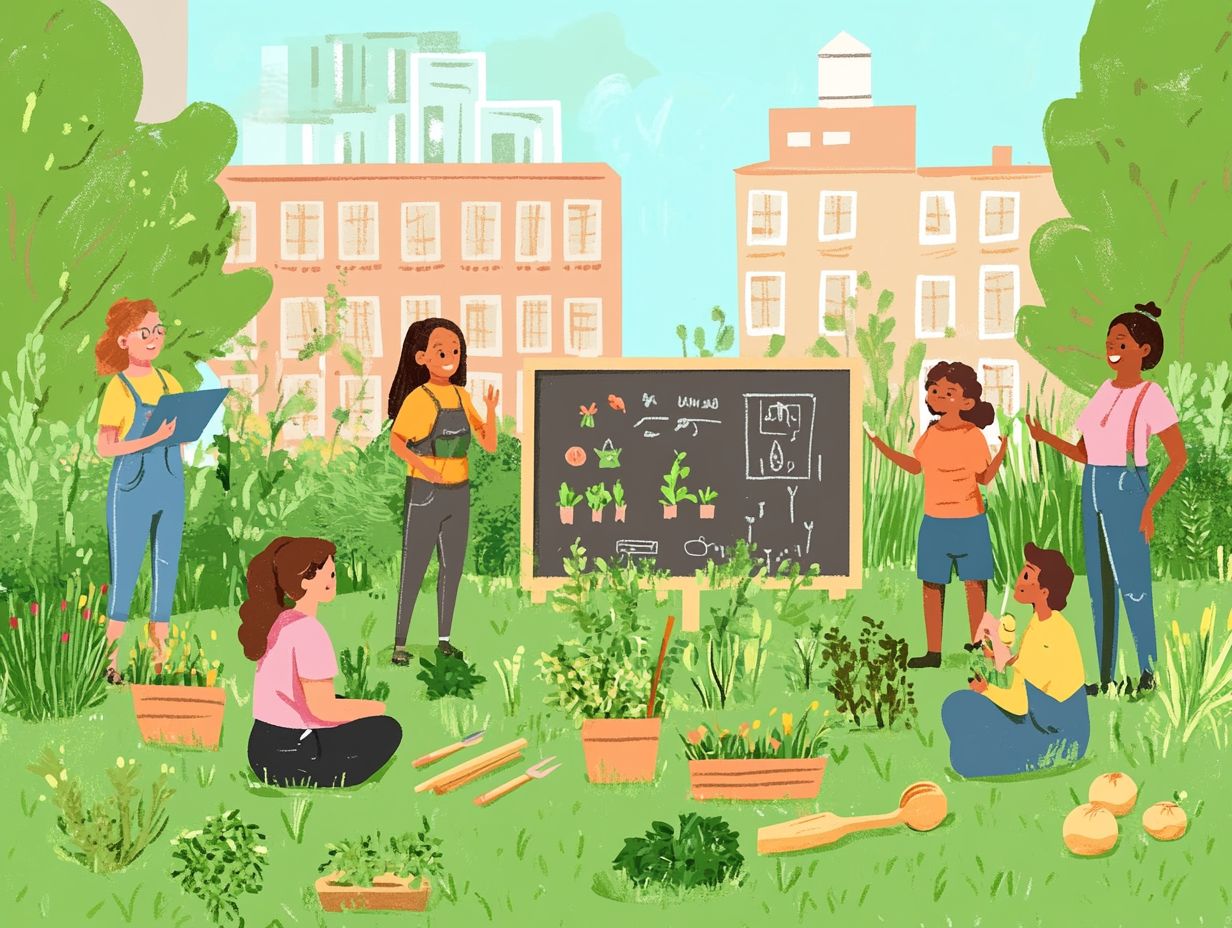
Both online and local resources are essential for permaculture groups. They offer an abundance of knowledge and support for sustainable gardening practices, guiding you in garden aesthetics and planning.
Platforms like Permies and various Facebook groups become vibrant hubs where you can connect with fellow enthusiasts, exchanging experiences and invaluable tips. Local organizations frequently host workshops that delve into the fundamentals of organic gardening and local ecosystem stewardship.
Community events, such as farmers’ markets and sustainability fairs, create opportunities for networking and the sharing of ideas. These enrich your understanding of practices like composting, crop rotation, and companion planting.
By engaging with these resources, you can refine your skills and actively contribute to a thriving environment, making sustainable choices that resonate within your community.
Overcoming Challenges in Starting a Permaculture Group
Overcoming challenges in starting a permaculture group is crucial for enhancing community involvement and securing the long-term sustainability of gardening initiatives. By addressing these hurdles, you create a vibrant space where collaboration thrives and ecological practices flourish, enriching both the community and the environment.
Common Obstacles and How to Overcome Them
Common obstacles you may encounter when starting a permaculture group include limited community support, challenges in resource sharing, and engagement issues among members.
Finding reliable partners who share your vision for sustainable practices can feel overwhelming. Foster local connections through community events or workshops to cultivate a sense of belonging and encourage collaboration.
Leverage local gardening resources like shared tool libraries or seed exchanges to enhance member engagement and improve resource availability.
By creating a welcoming atmosphere and promoting shared goals, you can help participants forge lasting relationships that invigorate the group’s mission toward environmental sustainability.
Frequently Asked Questions
1. What is a permaculture group?
A permaculture group is a community of people passionate about permaculture. This approach focuses on designing systems that meet human needs while caring for the environment.
2. Why should I start a permaculture group in my area?
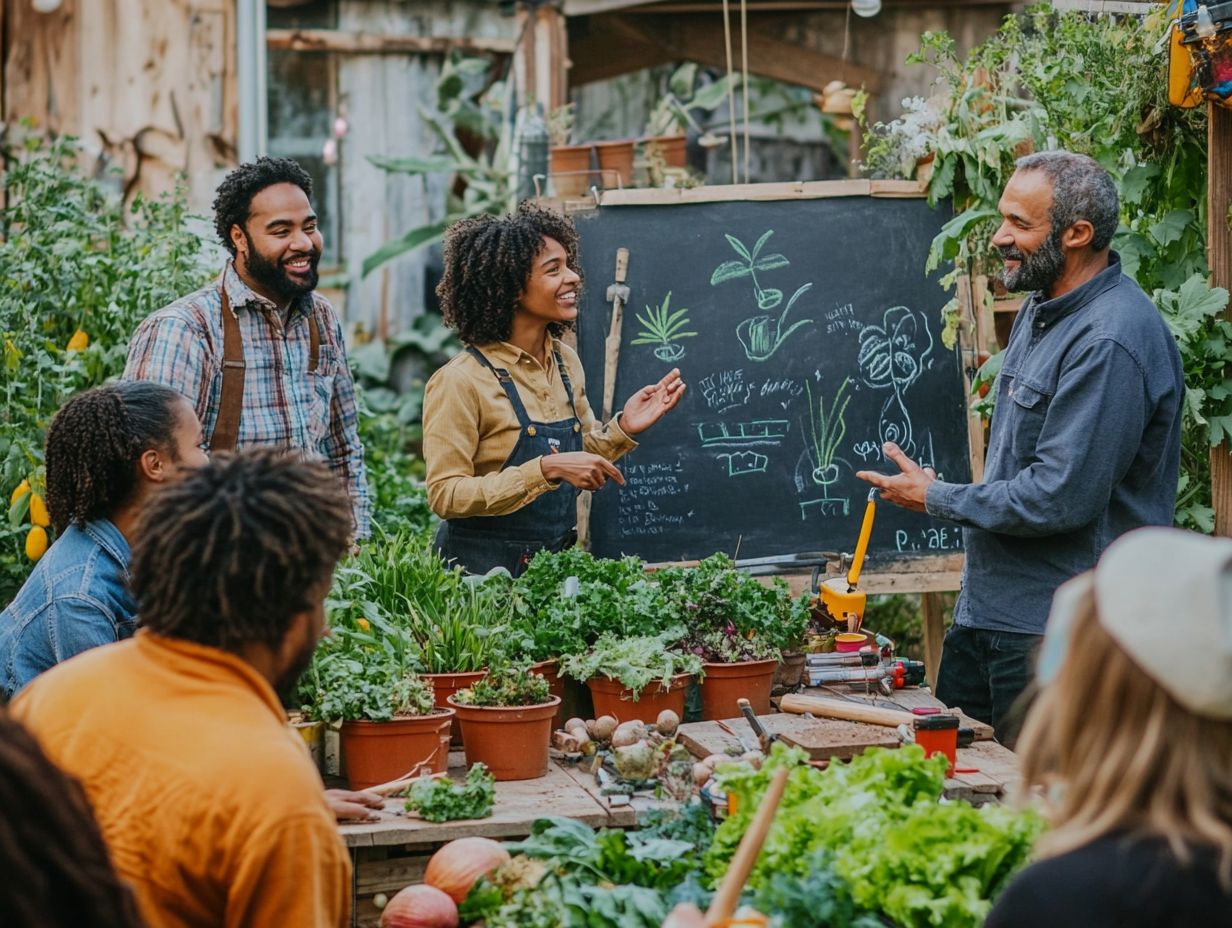
Starting a permaculture group in your area is an exciting opportunity to connect with like-minded individuals. If you’re wondering how to start a community permaculture project, you can learn and share knowledge about sustainable living practices.
3. How do I find others interested in permaculture in my area?
Reach out to local gardening or environmental organizations. Attend permaculture events and workshops to meet others who share your interests.
4. What activities can a permaculture group do together?
A permaculture group can organize workshops and skill shares. You might also create community gardens or host movie screenings and discussions.
5. Do I need to have experience in permaculture to start a group?
No prior experience in permaculture is necessary to start a group. Anyone with a passion for sustainability and a desire to learn can lead a permaculture group.
6. How can I ensure the success and longevity of a permaculture group?
To ensure a permaculture group thrives, set clear goals and keep communication open among members. Regular events will keep everyone engaged and motivated.
Diversity in skills and backgrounds among members will greatly contribute to the group’s growth and longevity.

